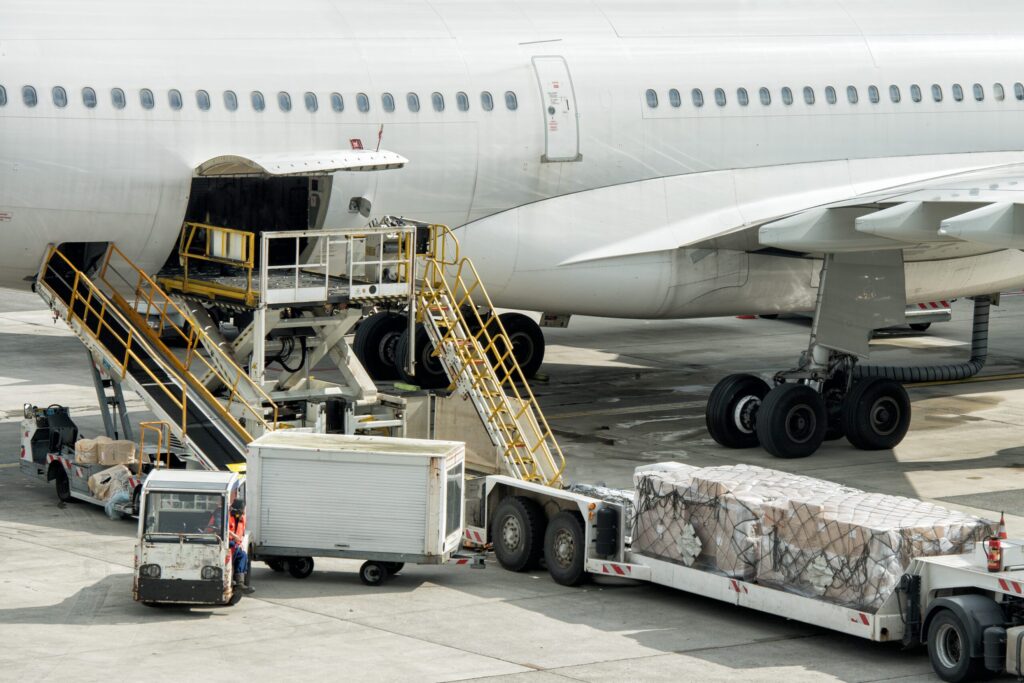- By Della tj
- October 14, 2025
- Sea Freight, Shipping
Shipping bags from China to the USA by sea is one of the most economical and dependable options for importers. The bags sea freight China to USA route offers bulk cost advantages, stable schedules, and strong supply chain integration. However, importers must understand the process, documents, and transit time to ensure smooth logistics and avoid delays.
Why Choose Sea Freight for Bags from China to the USA
Importing bags through sea freight is ideal for bulk orders, offering affordable rates per cubic meter compared to air freight. Additionally, sea routes allow flexibility for large or mixed shipments, making it the most cost-effective method for businesses.
Advantages include:
- Lower per-unit cost for heavy or bulky shipments
- Options for FCL (Full Container Load) and LCL (Less than Container Load)
- Reliable schedules through major ports like Shanghai, Ningbo, and Shenzhen
Disadvantages:
- Longer transit time (typically 25–40 days)
- Potential customs clearance delays
- Higher insurance requirements
Main Shipping Routes and Transit Time
Different ports in China serve various U.S. destinations. The table below shows average transit times and major routes for bags sea freight China to USA.
| Route | Origin Port (China) | Destination Port (USA) | Transit Time (Days) | Remarks |
|---|---|---|---|---|
| Shanghai → Los Angeles | Shanghai Port | Port of Los Angeles | 18–22 | Fastest route |
| Ningbo → New York | Ningbo Port | Port of New York | 28–35 | For East Coast delivery |
| Shenzhen → Houston | Yantian Port | Port of Houston | 25–30 | Suitable for central U.S. |
| Qingdao → Seattle | Qingdao Port | Port of Seattle | 20–25 | Ideal for northwest states |
Cost to Ship Bags from China to USA
The cost of bags sea freight depends on container size, shipment volume, and destination. Here’s a general pricing reference:
| Container Type | Average Cost (USD) | Capacity | Best For |
|---|---|---|---|
| 20ft Container | $1,800–$2,200 | 28 CBM | Small batch shipments |
| 40ft Container | $2,900–$3,400 | 58 CBM | Bulk orders |
| LCL (per CBM) | $80–$110 | Flexible volume | Mixed goods |
Additional fees:
- Port handling: $150–$250
- Customs clearance: $100–$200
- Insurance: 0.3%–0.5% of cargo value
Required Documents for Bags Sea Freight
Proper documentation ensures smooth customs clearance. Missing paperwork can cause costly delays.
Essential documents include:
- Bill of Lading (B/L) – Proof of shipment and contract between shipper and carrier
- Commercial Invoice – Indicates product details and value
- Packing List – Specifies package weight and dimensions
- Certificate of Origin (COO) – Verifies manufacturing source
- Import License or EIN – Required for U.S. customs
Pro Tip: Always cross-check your HS Code for bags (4202) to ensure correct classification and tariff calculation.
Real Case Studies: Bags Shipping from China to USA
Case 1 – FCL Shipment (Guangzhou → Los Angeles):
A sports bag retailer shipped 1,000 polyester gym bags (18 CBM) via 20ft container.
- Cost: $1,950 (including handling and insurance)
- Transit Time: 20 days
- Result: On-time delivery, 30% cheaper than air freight
Case 2 – LCL Shipment (Yiwu → New York):
A small importer consolidated leather handbags (4 CBM) from two suppliers.
- Cost: $420
- Transit Time: 33 days
- Result: Efficient consolidation, saving $350 in logistics fees
Customs and Import Regulations for Bags
Customs clearance plays a key role in shipping efficiency. Bags are categorized under HS code 4202, subject to import duties between 10–18%, depending on materials.
Documents customs officers often check:
- Product material verification (e.g., leather, fabric, synthetic)
- Compliance with CPSIA and labeling rules
- Importer’s EIN registration
Tip: Work with an experienced customs broker to handle classification, valuation, and tax declaration correctly.
Comparing Sea Freight with Air Freight and Rail
| Method | Cost | Transit Time | Best For | Pros | Cons |
|---|---|---|---|---|---|
| Sea Freight | Low | 25–40 days | Bulk bags, mixed cargo | Cheapest option | Slow |
| Air Freight | High | 5–8 days | Urgent or high-value bags | Fast, secure | Expensive |
| Rail Freight | Medium | 15–22 days | Central U.S. deliveries | Reliable & eco-friendly | Limited coverage |
Conclusion: For most bag shipments, sea freight remains the most cost-efficient solution, balancing budget and reliability.
How to Reduce Bags Sea Freight Costs
Although shipping is already affordable, several strategies can further reduce logistics expenses.
Smart cost-saving tips:
- Consolidate shipments: Combine cargo to fill containers.
- Book off-season: Avoid peak months (Sept–Dec).
- Choose nearby ports: Los Angeles or Seattle can cut inland transport costs.
- Use long-term contracts: Negotiate with forwarders for stable rates.
Additional considerations:
- Monitor currency fluctuations.
- Optimize packaging to maximize space usage.
- Always compare rates from at least 3 freight forwarders.
Conclusion
Shipping bags from China to the USA by sea offers importers an efficient balance between cost, flexibility, and volume. With proper documentation, customs preparation, and reliable partners, the bags sea freight China to USA route ensures steady supply chains and predictable delivery times.
For long-term import success, focus on cost control, timely booking, and professional freight management — ensuring your bags reach American markets safely and affordably.
- Consult TJ China Freight Forwarding for the lowest quote. They will provide you with reliable, cost-effective service.
FAQ:
Q1.What is the average shipping time for bags sea freight from China to USA?
Transit time ranges from 25 to 40 days depending on port selection, customs efficiency, and weather conditions.
Q2.How can I calculate the sea freight cost for bag shipments?
Freight cost depends on container size, shipment volume, and route. Request a detailed quote from your forwarder.
Q3.Can I ship a small volume of bags by sea?
Yes, LCL shipping allows small batches to be consolidated with other cargo, saving cost and space.
Q4.What taxes apply when importing bags from China to the USA?
Import duties usually range between 10–18%, plus customs fees depending on bag material classification.
Q5.Do I need an import license for shipping bags?
Yes, U.S. customs require an EIN or import license before clearance of commercial bag shipments.




